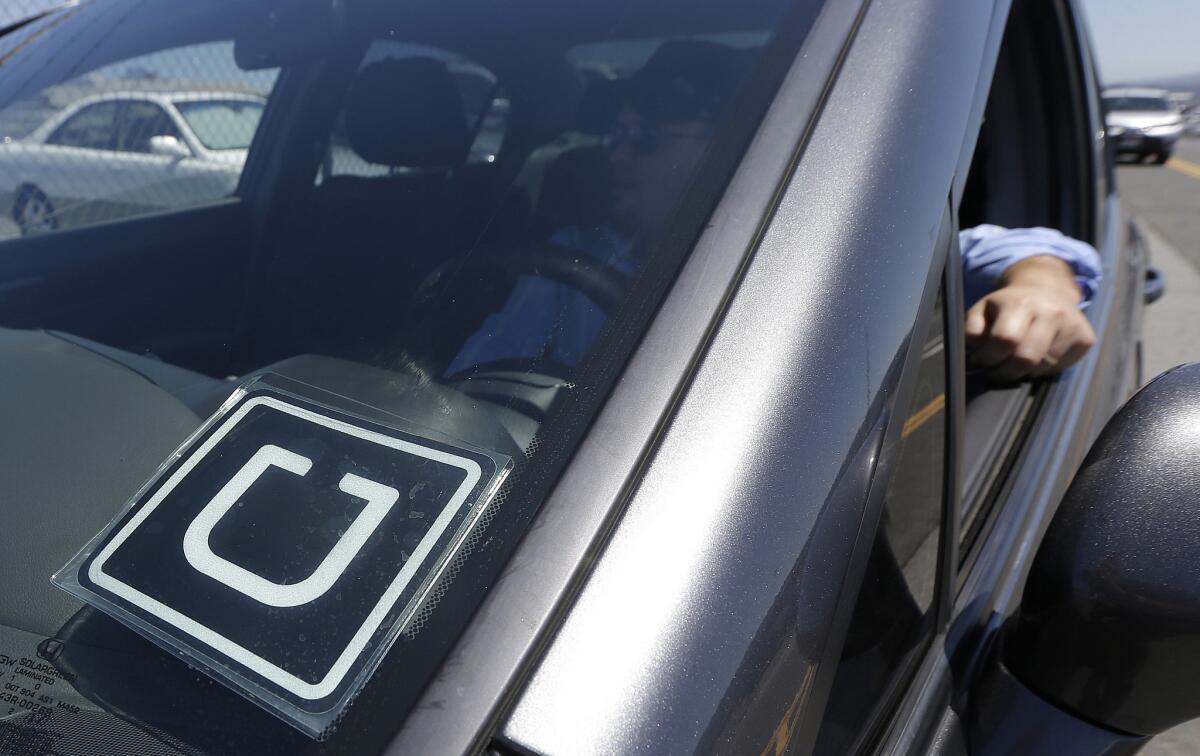The largest taxi company in Uber and Lyft’s hometown is near bankruptcy

An Uber driver parked near the San Francisco International Airport in July.
- Share via
“Hailing a cab” once meant stretching an arm out toward a city’s open streets and attracting the attention of a ubiquitous yellow car. But the phrase and accompanying gesture have since been retired in favor of its digital substitute: fumbling for a phone in a pocket to “get an Uber.”
The clearest sign of the ride-hailing app’s growing dominance came this week, as the San Francisco Examiner reported that the largest taxi company in San Francisco, where Uber and its competitor Lyft have their headquarters, is on the verge of filing for bankruptcy.
Yellow Cab Co-Op is preparing to file for Chapter 11 bankruptcy, according to a letter to shareholders obtained by the Examiner.
See more of our top stories on Facebook >>
“We are in a midst of serious financial setbacks,” Yellow Cab President Pamela Martinez wrote. “Some are due to business challenges beyond our control and others are of our own making. Today we are faced with fiscal obligations that far exceed expected income.”
The letter is dated Dec. 10, just two days after Martinez replaced Yellow Cab President James Gillespie, who remains the company’s general manager. It said documents were being prepared for the bankruptcy filing to move forward “within a month” — in other words, any time now.
Yellow Cab is a cooperative co-owned by 300 shareholders who haven’t received dividends since October, Gillespie told the Examiner. It transports more than 5 million passengers a year.
“Yellow is still the best taxi brand in San Francisco,” Martinez said in the letter, but “we used to have more [passengers] and our goal is to get them and even more back. ... We must get the public to smile when they think of Yellow Cab and the way to that goal is to be more welcoming and responsive by making an extra effort, no matter the obstacles, to ensure that this happens.”
Neither Uber nor Lyft is mentioned by name in the statement, but the two ride-hailing services loom large over Yellow Cab’s troubles.
SIGN UP for the free California Inc. business newsletter >>
For instance, Martinez mentioned a “need to have not just more drivers but drivers who are happy to be behind the wheel” — possibly a subtle nod to the high pay, frequent bonuses and flexibility that Uber drivers are supposed to enjoy even while offering riders more affordable prices. A year ago, Uber released internal data showing that its drivers in San Francisco make an average of $23 an hour, compared to slightly less than $14 for traditional taxi drivers and chauffeurs.
This report has been criticized for neglecting to factor in the costs of gas, car insurance and vehicle maintenance associated with driving one’s own car. That hasn’t stopped Uber’s driver base from growing quickly, though most of its drivers (two-thirds, as of last year) have at least one other part-time job.
Is Yellow Cab Uber’s “first casualty,” as Forbes has proposed? Although other taxi businesses, such as the original Yellow Cab Company in Chicago and 22 companies in New York, have also filed for Chapter 11 bankruptcy, none carry as much symbolic weight as the biggest company in Uber and Lyft’s hometown.
Competition aside, the Yellow Cab has also been stymied by a June 2015 court ruling that found the company liable for injuries incurred by a passenger in one of its vehicles.
In a statement to the San Francisco Chronicle, Gillespie attributed Yellow Cab’s current financial situation to the “unusual number of accident claims” it has recently faced.
Speaking with the Examiner, Gillespie pointed to the case of Ida Fua, a 28-year-old attorney who was riding a Yellow Cab home from the airport when the taxi struck a stopped vehicle at 60 to 65 mph. The crash left Fua paralyzed on one side of her body and suffering from brain trauma, and her attorney argued that Yellow Cab was responsible.
Although the taxi company countered that it merely provides vehicles and a dispatch service and does not directly employ drivers, a California Superior Court judge ruled that because the driver was an “ostensible employee,” Yellow Cab should pay $8 million in damages.
Wang writes for the Washington Post.
MORE BUSINESS NEWS
Yahoo could lay off 10% of its workforce, report says
Apple shares are falling as iPhone sales become a cause for concern
Macy’s to slash 4,800 jobs and close 40 stores after disappointing holidays






